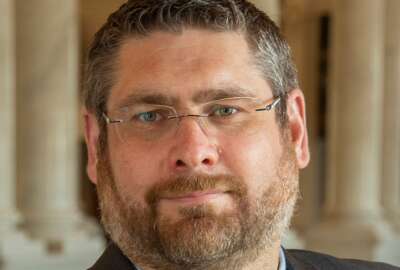Congress’ copyright office has its first chief economist
One arm of the government's intellectual property protection machinery has a new position and a new person to fill it.
Best listening experience is on Chrome, Firefox or Safari. Subscribe to Federal Drive’s daily audio interviews on Apple Podcasts or PodcastOne.
One arm of the government’s intellectual property protection machinery has a new position and a new person to fill it. The U.S. Copyright Office, a congressional branch agency, has appointed its first chief economist. To explain for himself the connection between copyrights and economics, economist Brent Lutes joined the Federal Drive with Tom Temin.
Interview transcript:
Tom Temin: Dr. Lutes, good to have you on.
Brent Lutes: Thanks, Tom. I’m happy to be here.
Tom Temin: And what is an economist doing at the Copyright Office?
Brent Lutes: So having an economist at the Copyright Office makes a lot of sense from several perspectives, probably the most obvious of which is the outsized role that the copyright system plays in our economy. If you sit back and think about it, the number of industries that are existentially reliant on the copyright system is really staggering. We all think about copyrights as protecting creators. They absolutely do that, but that’s really only the first line of their effects.
Tom Temin: Yes, I mean, you think of it as somebody who writes a book or a book of poetry, and they get a copyright on it, or they write a song. And then, a few years later, after the copyright expires, then they can sell it to Warner Brothers for $10 trillion. But how about in the corporate world and the real economy producing world? How do the copyrights play in there?
Brent Lutes: The purpose of the copyright is to incentivize the creation of works. And it’s those works that feed all the downstream industries. Take music, for example, we have copyrights to protect songwriters, and performers, recording artists. Without those copyrights, those creators wouldn’t be incentivized to create those works in the first place. And without those works, we’re not going to have any streaming platforms, we’re not going to have downloading platforms, we’re not going to have live musical events, or music and movies or music and advertising. And it’s not just for music, the same thing exists in movies and literature and software and video games, even textiles, all these downstream industries are extensively reliant on the creation of the works in the first place. And the creation of those works is incentivized by the copyright system. So a few studies that put all the annual revenues from the industries that are existentially reliant on the copyright system at between $1.2 and $2.5 trillion a year. And to put that into context, that’s about 6% to 12% of the U.S. GDP. And if you’re thinking about in that context, would you have a singular system upon which about 10% of the U.S. economy is reliant on, it’s probably a good idea to have an economist involved with that system.
Tom Temin: All right. And you were appointed by Shira Perlmutter, who is the current register of copyrights. What did she tell you that she would hope for in having an economist as it relates to policies and so forth, and operation even, according to her statement, with respect to having an economist on board?
Brent Lutes: Register Perlmutter’s really given me a lot of leeway to help shape what this position is going to be. You touched on a couple of aspects. There’s going to be an internal component and an external component. And the internal component will be understanding how policy decisions and operational decisions affect access to and benefits from our copyright system, then we’ll have an external component where a large part of my job will be establishing a research agenda, not just for myself, for the copyright office, but hopefully for the academic community to answer the questions that we really care about. From a policy perspective.
Tom Temin: We’re speaking with Dr. Brent Lutes, he is the first chief economist of the U.S. Copyright Office. And what are some of the top of mind questions that economics research could maybe answer or at least point to?
Brent Lutes: I can tell you about some of the work we’re already involved with. Professor Joel Waldfogel, has been involved with the copyright office for a number of months now. And they’ve engaged him to, among other things, look at gender disparities in access to and benefits from the copyright system. By the way, we’re going to be releasing a report on his findings in the next few weeks. Building on that I’ll be working with Joel to further that research and drill down and try to figure out why these gender disparities exist in certain areas and not in other areas. And to further that, into looking at racial and ethnic disparities, as they relate to access to the copyright system.
Tom Temin: That’s an interesting question access because anybody can go to the copyright office, it’s really easy to get a copyright, for that matter to get a trademark. I mean, the process is easy. There’s some examination that goes on, but it’s hard to picture how access might be an issue for any group or individual.
Brent Lutes 4:33
It is a question that we can answer empirically. So backing up a little bit, if we see disparities in the usage of the system, then you need to ask the question, is that because of access or is that because of something else? And, you know, you could think of maybe it’s not access in that anybody is necessarily prevented from getting into the system or from using the system, but there may be certain groups that aren’t as aware of how to access the system, or the benefits of accessing the system.Tom Temin: Sure, and do you think that perhaps in the age of TikTok, and before that YouTube and all of these things, people just do something, even write a song, create a piece of intellectual property, stick it on there, because they get likes in the thousands or ten thousands or millions, and maybe you don’t give thought to the fact that, hey, this could be copyrighted. Maybe it’s an age and cultural thing, not so much racial or gender, but people just reared in the YouTube and TikTok age?
Brent Lutes: That really speaks to the heart of the role of economics in copyright, which is the incentives to create works in the first place. And traditionally, we think the incentives to created work are financial, that’s why we have a copyright system to give creators monopoly over their work and to be able to sell it. But it’s an interesting question that you raised. Are there other incentives? And there likely are but what are those other incentives that aren’t financials that encourage people to create works? And that may be likes, that maybe notoriety and maybe legacy? There’s a number of different things? And that’s an important question from a policy perspective, because the core policy objective of copyright, again, is to incentivize the creation and distribution of work.
Tom Temin: Ultimately, they’ll all learn the best incentive is good old cash on the barrelhead, perhaps, but it’s a matter of age. And just tell us about yourself, what is your background? And how did you come to end up at the Copyright Office?
Brent Lutes: As you may guess, I’m an economist. In particular, I’m an empirical micro economist. I became interested in economics before I really knew that it was a discipline of study or what it was. I was a soldier in the Army stationed Iraq shortly after our initial invasion of the country. And it was really in shambles at that time. And I found it just absolutely fascinating to see how people reacted to incentives, and how all those incentives quickly coalesced into informal markets, which then formed more formal markets, and essentially, the quick establishment of economies. And you know, as a 20-year-old soldier, I didn’t have the words to articulate those ideas. But the ideas themselves were very interesting to me. And fast forward a few years later, in college and by happenstance, take an economics class because I think the class I really wanted was filled up. So I took the class. And it dawned on me that this was a study of those ideas that really captured me. And within a week, I think I changed my major, I enjoyed it so much, I went through and got a PhD. And in my PhD. studies, I was particularly interested in the relationship between economics and governance, in particular regulatory and legislative governance. And now, those studies are particularly relevant to my work. But directly after that switching my PhD. program, I decided to take the private sector route and went into economic consulting. I worked for a company called the Brattle Group, which is a top economic consultancy. And there I did mainly litigation and regulatory consult in the context of intellectual property. So mostly patents and copyrights, occasionally, trade secrets, and trademarks. And I found that work incredibly interesting. Mainly, what I would do is figure out the market value of individual pieces of intellectual property, or figure out kind of what the optimal or socially optimal royalty rate might be for some sort of statutory licensing program. And it was incredibly exciting, interesting work. To have hundreds of billions of dollars hinge on the outcome of my economic analysis was very gratifying, and sometimes scary. But doing that, I wasn’t really in the market for a new job. I very much enjoyed that work. But then again, by happenstance, the job posting for this position sort of came by my desk and I looked at it and I sort of realized the gravity of what they’re asking for and realize that was the perfect job for me. And this breadth of experience that I had not just dealing with academic issues but also dealing with industry stakeholders, dealing with the legal infrastructure around intellectual property gave me the perfect background to be successful in this role and really shape it into what it needs to be.
Tom Temin: All right, so you’ve gone from soldier pay to private consulting economics pay. Now you’re back closer to soldier pay.
Brent Lutes: A little bit better than soldier pay, but it’s still a bit of a roller coaster.
Tom Temin: All right. Dr. Brent Lutes is the first chief economist at the U.S. Copyright Office. Thanks so much for joining me.
Brent Lutes: Thanks, Tom. It’s been a pleasure.
Copyright © 2025 Federal News Network. All rights reserved. This website is not intended for users located within the European Economic Area.
Tom Temin is host of the Federal Drive and has been providing insight on federal technology and management issues for more than 30 years.
Follow @tteminWFED





